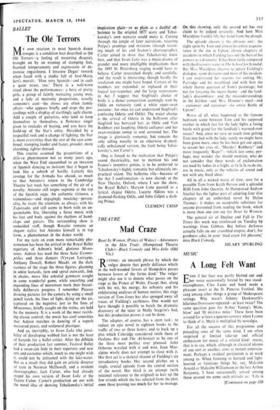THEATRE
Mad Craze
RUTTING: an uncouth phrase by which the vulgar denote that gentle dalliance which in the well-wooded forests of Hampshire passes between lovers of the ferine kind.' The vulgar might also use it to denote what passes on the stage at the Prince of Wales. Except that, along with his wit, his energy, his urbanity and his exhilarating analyses of human motive, this stage version of Tom Jones has also sponged away all traces of Fielding's earthiness. One would not have thought it possible to botch the dramatic discovery of the tutor in Molly Seagrim's bed, but this production proves it can be done.
The adapter, of course, has a stern task : to reduce an epic novel in eighteen books to the traffic of two or three hours; and to hack up a plot which Coleridge considered (with those of Oedipus Rex and The Alchemist) to be one of the three most perfect ever planned. John Osborne wrestled with it and won. Joan Mac- alpine wisely does not attempt to close with it. Her first act is a skeletal résumé of Fielding's six introductory books. Her second pitches on a single, crucial episode from the central section of the novel. Her third is an attempt (with minimal reference to the original) to knit up the few strands which she has selected from the plot, even these proving too much for her to manage.
On this showing, only the second act has any claim to be judged seriously. And here Miss Macalpine frankly lifts her hand from the plough.
The episode chosen is the obvious one: the night spent by Tom and almost his entire acquain- tance in the inn at Upton, eleven chapters of accidents in which Fielding lays out the best of his powers as a dramatist. It has been fairly compared with the discovery scene in The School for Scandal. But Miss Macalpine chooses to ignore Fielding's dialogue, scene divisions and most of his incident. I can understand her reasons for cutting Mr.
Partridge and his nosebleed and with him the whole thorny question of Tom's parentage; but not for forgoing the incest theme--and the land- lady's discomfiture--and the misunderstandings in the kitchen—and Mrs. Honour's meal—and —curiouser and curiouser—the entire Battle of Upton!
Worst of all, what happened to the famous bedroom scene between Tom and his supposed mother in which lust for the lady fights a losing battle with greed for the landlady's warmed-over meats? And, since we save so much time getting Tom into bed with the lady, surely we might have been given more, once he has been got out again, to savour her cries of: 'Murder! Robbery!' and more frequently 'Rape!'—'which last some, per- haps, may wonder she should mention, who do not consider that these words of exclamation are used by ladies in a fright, as fa la la ra da etc. are in music, only as the vehicles of sound and not with any fixed ideas.'
All in all a wicked waste of time, save for a
passable Tom from Keith Barron and a splendid Blifil from John Quentin. At Hampstead Andrew Sinclair has the lighter part of adapting four slim chapters of an unfinished novel by Dylan Thomas: it makes an acceptable substitute for anyone prevented from reading the book, which is more than one can say for Beset by Women.
The general air of Decline and Fall in The Times this week was reinforced on Tuesday by warnings from Gibbon. But before darkness actually falls on our crumbled empire, don't, for goodness sake, in your 'mad craze for pleasure,' miss Black Comedy.
HILARY SPURLING


































 Previous page
Previous page